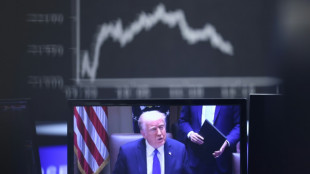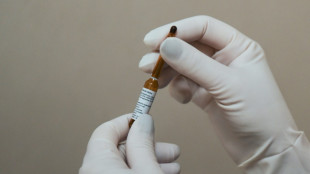
-
 UK comedian Russell Brand charged with rape
UK comedian Russell Brand charged with rape
-
Marsh, Markram help Lucknow edge Mumbai in IPL

-
 Trump gives TikTok extra 75 days to find buyer
Trump gives TikTok extra 75 days to find buyer
-
Israel attorney general accuses PM of 'conflict of interest' in security chief dismissal

-
 Emery glad to see Rashford make landmark appearance
Emery glad to see Rashford make landmark appearance
-
Sean 'Diddy' Combs faces more charges ahead of criminal trial

-
 Russian missile strike kills 14 in Ukraine leader's home city
Russian missile strike kills 14 in Ukraine leader's home city
-
Trump's tariff Big Bang puts global economy under threat

-
 I Am Maximus backed for National as Mullins hot streak continues
I Am Maximus backed for National as Mullins hot streak continues
-
2014 World Cup winner Hummels to retire at season's end

-
 Intercommunal violence kills dozens in central Nigeria
Intercommunal violence kills dozens in central Nigeria
-
Nigerian, S. African music saw 'extraordinary growth' in 2024: Spotify

-
 Russell Brand: From Hollywood star to rape suspect
Russell Brand: From Hollywood star to rape suspect
-
France soccer star Mbappe unveiled in London... in waxwork form

-
 Trump goads China as global trade war escalates
Trump goads China as global trade war escalates
-
Israel expands Gaza ground offensive, hits Hamas in Lebanon

-
 TikTok faces new US deadline to ditch Chinese owner
TikTok faces new US deadline to ditch Chinese owner
-
US Fed Chair warns tariffs will likely raise inflation, cool growth

-
 Mbappe among three Real Madrid players fined for 'indecent conduct'
Mbappe among three Real Madrid players fined for 'indecent conduct'
-
How can the EU respond to Trump tariffs?

-
 Canada loses jobs for first time in 3 years as US tariffs bite
Canada loses jobs for first time in 3 years as US tariffs bite
-
Real Madrid and Barcelona respect each other, says Ancelotti

-
 Nations divided ahead of decisive week for shipping emissions
Nations divided ahead of decisive week for shipping emissions
-
Trump goads China after Beijing retaliates in global trade war

-
 Arteta urges Arsenal to enjoy "beautiful" run-in despite injury woes
Arteta urges Arsenal to enjoy "beautiful" run-in despite injury woes
-
London mayor gets new powers to revive capital's ailing nightlife

-
 Italy's ski star Brignone takes on 'new challenge' after serious leg injury
Italy's ski star Brignone takes on 'new challenge' after serious leg injury
-
Amorim in a 'rush' to succeed at Man Utd

-
 PSG coach Luis Enrique targets unbeaten season
PSG coach Luis Enrique targets unbeaten season
-
Duterte victims seeking 'truth and justice': lawyer

-
 US job growth strong in March but Trump tariff impact still to come
US job growth strong in March but Trump tariff impact still to come
-
UK comedian and actor Russell Brand charged with rape

-
 Stocks, oil slump as China retaliates and Trump digs in heels
Stocks, oil slump as China retaliates and Trump digs in heels
-
Postecoglou 'falling out of love' with football due to VAR

-
 EU hails 'new era' in relations with Central Asia
EU hails 'new era' in relations with Central Asia
-
US hiring beats expectations in March as tariff uncertainty brews

-
 'Unique' De Bruyne one of the greats, says Guardiola
'Unique' De Bruyne one of the greats, says Guardiola
-
Automakers shift gears after Trump tariffs

-
 Where things stand in the US-China trade war
Where things stand in the US-China trade war
-
De Bruyne to leave Man City at end of the season

-
 Youthful Matildas provide spark in friendly win over South Korea
Youthful Matildas provide spark in friendly win over South Korea
-
Stocks, oil extend rout as China retaliates over Trump tariffs

-
 De Bruyne says he will leave Man City at end of season
De Bruyne says he will leave Man City at end of season
-
UK spy agency MI5 reveals fruity secrets in new show

-
 Leverkusen's Wirtz to return 'next week', says Alonso
Leverkusen's Wirtz to return 'next week', says Alonso
-
England bowler Stone to miss most of India Test series

-
 Taiwan earmarks $2.7 bn to help industries hit by US tariffs
Taiwan earmarks $2.7 bn to help industries hit by US tariffs
-
Rat earns world record for sniffing landmines in Cambodia

-
 Elton John says new album 'freshest' since 1970s
Elton John says new album 'freshest' since 1970s
-
EU announces 'new era' in relations with Central Asia

| RBGPF | 1.48% | 69.02 | $ | |
| CMSD | 0.44% | 22.77 | $ | |
| AZN | -7.68% | 68.65 | $ | |
| SCS | -2.29% | 10.5 | $ | |
| RIO | -7.53% | 54.34 | $ | |
| CMSC | 0.36% | 22.34 | $ | |
| GSK | -7.2% | 36.39 | $ | |
| BTI | -4.89% | 39.965 | $ | |
| NGG | -5.39% | 65.84 | $ | |
| RYCEF | -15.98% | 8.45 | $ | |
| BCC | -0.17% | 94.465 | $ | |
| BCE | 1.13% | 22.92 | $ | |
| RELX | -5.58% | 48.72 | $ | |
| JRI | -7.28% | 11.95 | $ | |
| VOD | -10.82% | 8.455 | $ | |
| BP | -10.14% | 28.455 | $ |

WHO weighs up AI risks and benefits for healthcare
Generative artificial intelligence could transform healthcare through things like drug development and quicker diagnoses, but the World Health Organization warned Thursday of the potential pitfalls in rushing to embrace AI.
The WHO has been examining the likely dangers and benefits posed by AI large multi-modal models (LMMs), which are relatively new and are quickly being adopted in health.
In generative AI, algorithms trained on data sets can be used to produce new content.
LMMs are a type of generative AI which can use multiple types of data input, including text, images and video, and generate outputs that are not limited to the type of data fed into the algorithm.
"Some say this mimics human thinking and behaviour, and the way it engages in interactive problem-solving," WHO digital health and innovation director Alain Labrique told a press conference.
The WHO said LMMs were predicted to have wide use and application in health care, scientific research, public health and drug development.
The UN health agency outlined five broad areas where the technology could be applied.
These are: diagnosis, such as responding to patients' written queries; scientific research and drug development; medical and nursing education; clerical tasks; and patient-guided use, such as investigating symptoms.
- Misuse, harm 'inevitable' -
While this holds potential, WHO warned there were documented risks that LMMs could produce false, inaccurate, biased or incomplete outcomes.
They might also be trained on poor quality data, or data containing biases relating to race, ethnicity, ancestry, sex, gender identity or age.
"As LMMs gain broader use in health care and medicine, errors, misuse and ultimately harm to individuals are inevitable," the WHO cautioned.
They could lead to "automation bias", where users blindly rely on the algorithm -- even if they have good grounds to disagree.
On Thursday the WHO issued recommendations on the ethics and governance of LMMs, to help governments, tech firms and healthcare providers take advantage of the technology safely.
The WHO said it did not want to wait for roll-out in healthcare settings to discover the flaws and then try to fix them afterwards.
"Generative AI technologies have the potential to improve health care but only if those who develop, regulate and use these technologies identify and fully account for the associated risks," said WHO chief scientist Jeremy Farrar.
"We need transparent information and policies to manage the design, development and use of LMMs."
The WHO said liability rules were needed to "ensure that users harmed by an LMM are adequately compensated or have other forms of redress".
- Tech giants' role -
AI has been used in public health and clinical medicine for more than a decade, for example to help in radiology and medical imaging.
The WHO stressed, however, that LMM formats presented "risks that societies, health systems and end-users may not yet be prepared to address fully".
This included concerns as to whether LMMs complied with existing regulation, including on data protection -- and the fact they were often developed by tech giants, due to the significant resources required, and so could entrench these companies' dominance.
The guidance recommended that LMMs should be developed not just by scientists and engineers alone but with medical professionals and patients included.
Governments will have to ensure privacy when patients' sensitive health information is fed in as data -- and give people the chance to opt out of involvement, said Rohit Malpani, of the WHO's research for health department.
The WHO warned that LMMs were vulnerable to cyber-security risks that could endanger patient information, or even the trustworthiness of healthcare provision.
The WHO said governments should assign a regulator to approve LMM use in health care, and there should be auditing and impact assessments.
The guidance "paves the way for a future where AI contributes to the well-being of humanity, adhering to the highest ethical standards", said Labrique.
A.Mahlangu--AMWN


